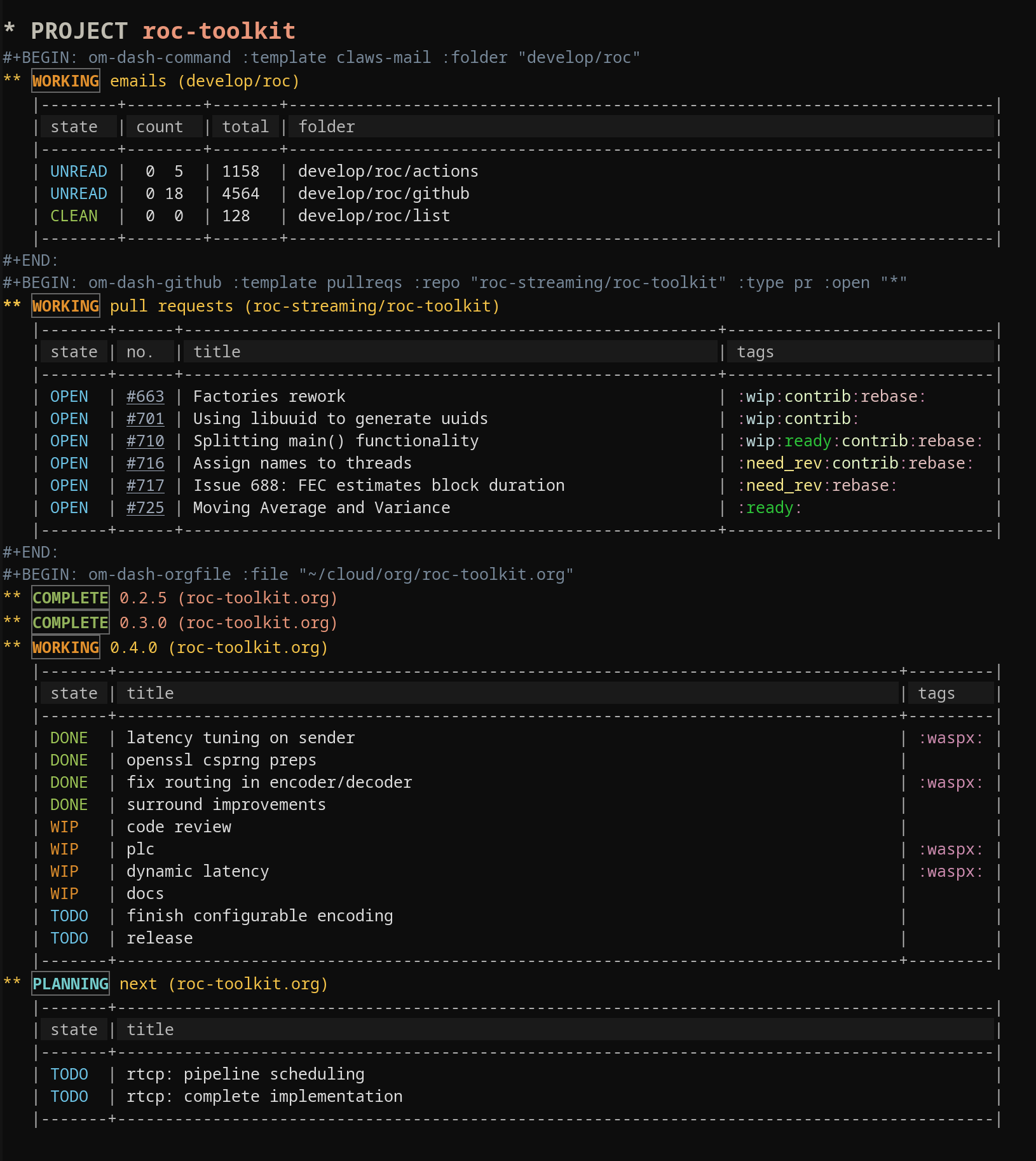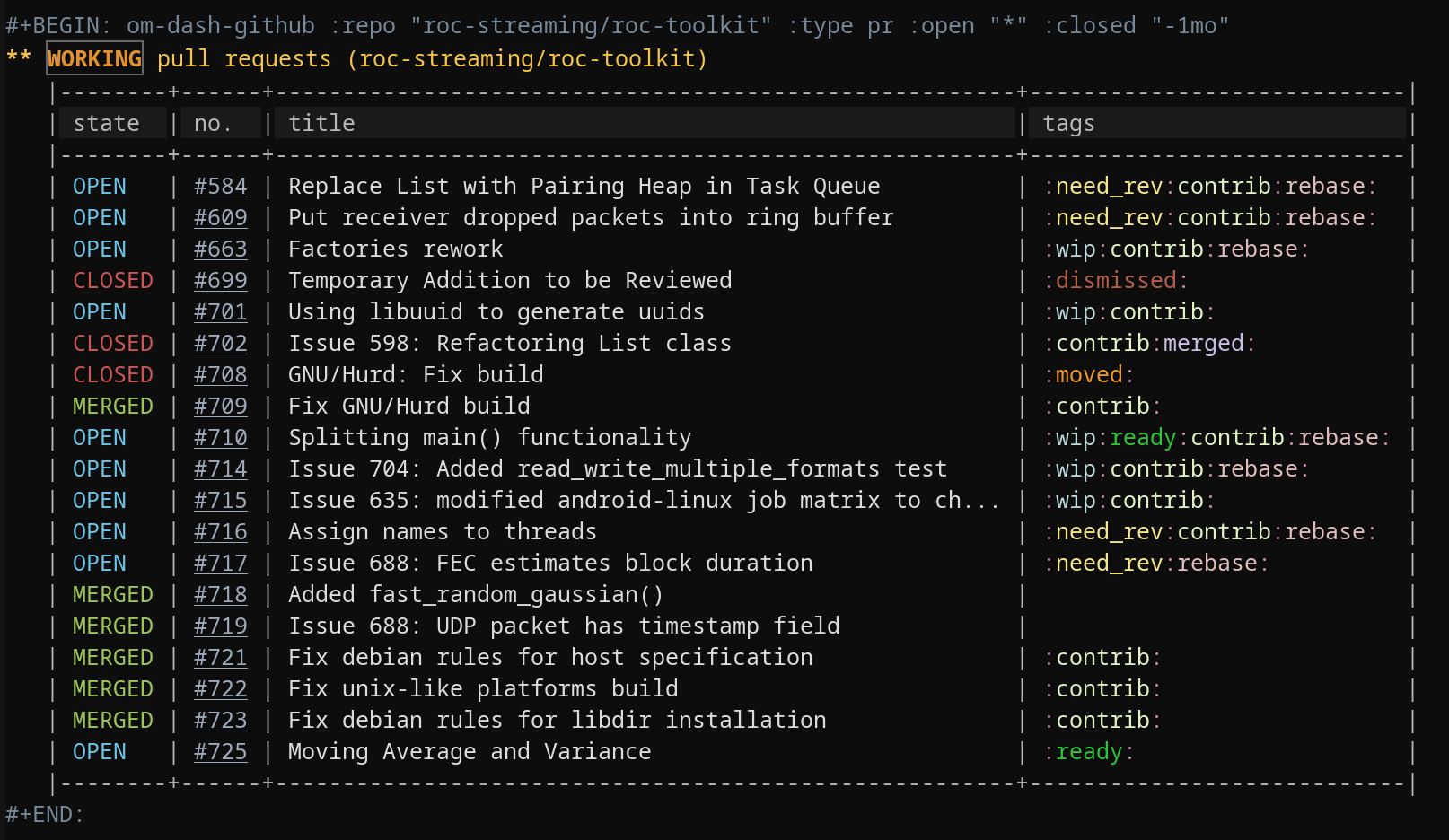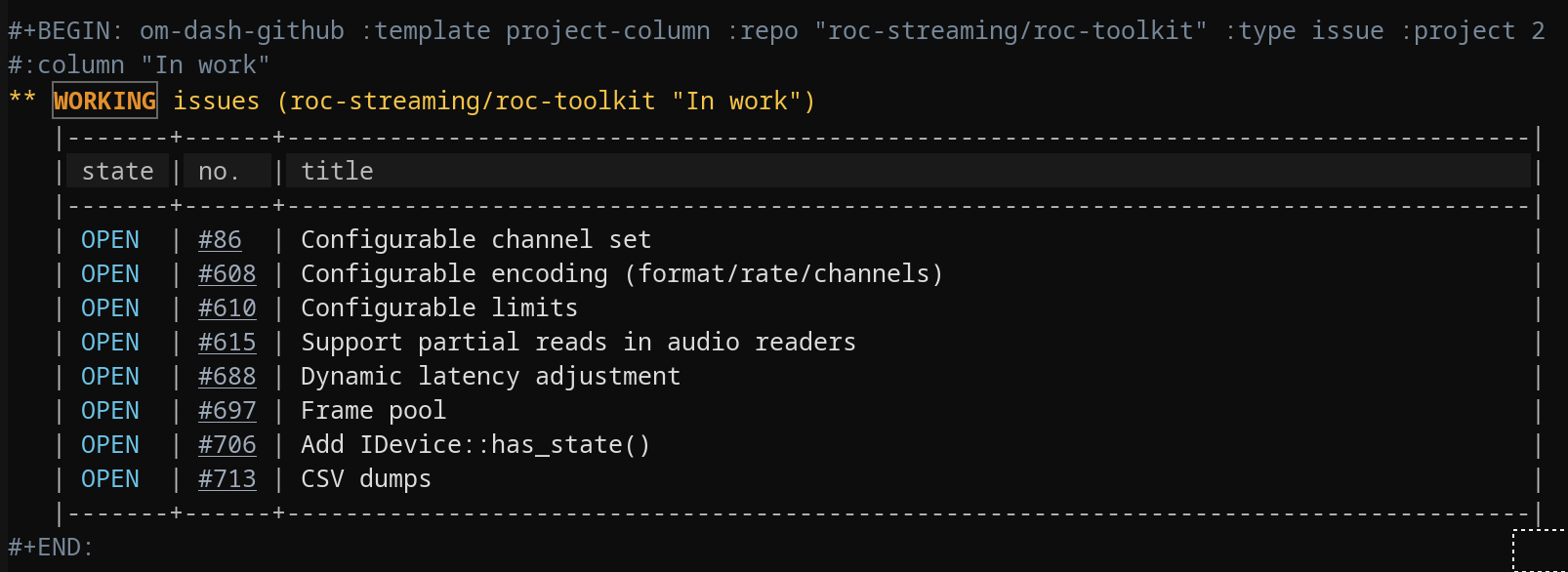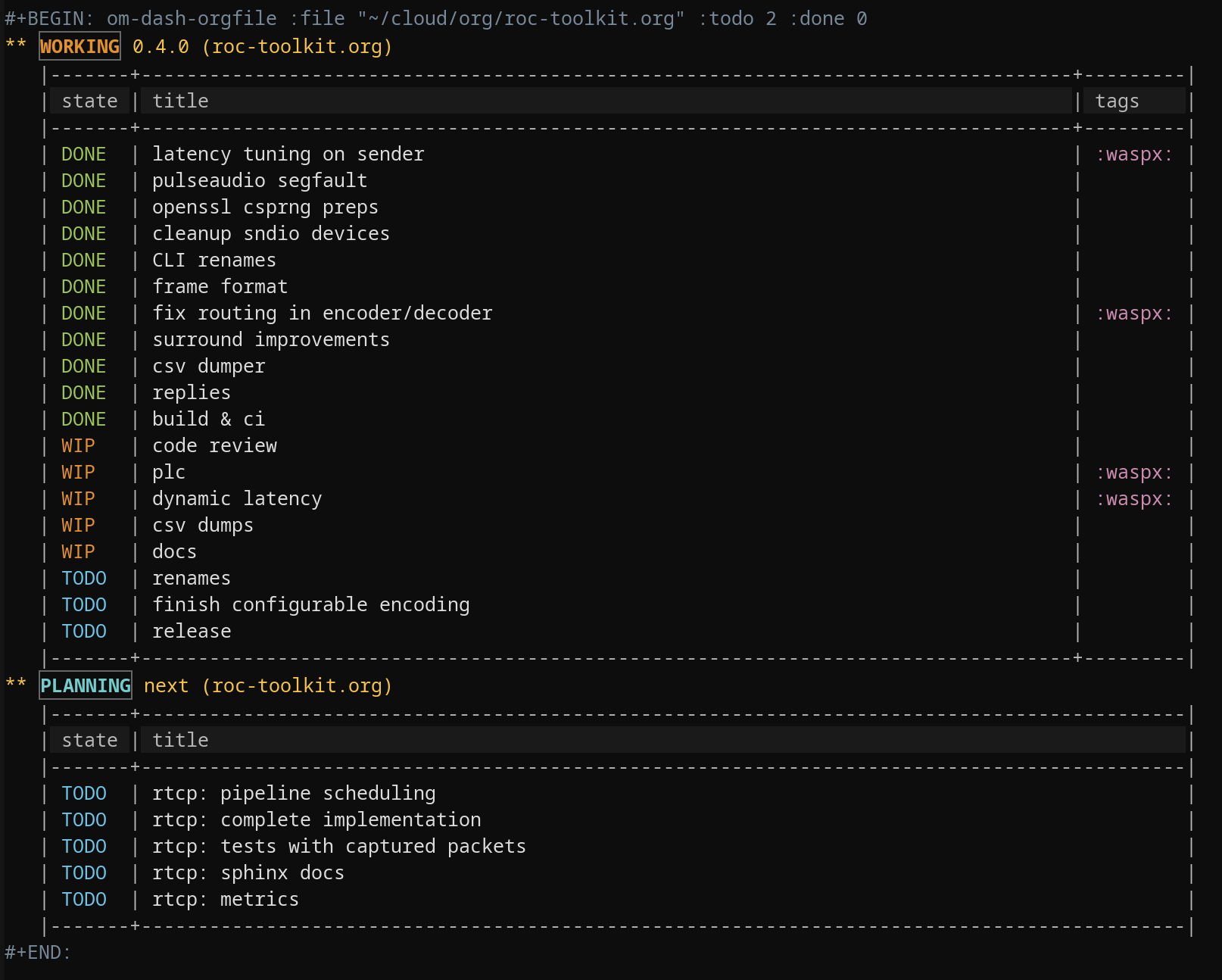- What is this?
- Example workflow
- Example blocks
- Contributions
- Releases
- Installation
- Updater functions
- Dynamic blocks
- Templates
- Minor mode
- Variables
- Faces
- Authors
- License
om-dash implements dynamic blocks for org-mode that you can use to compose a custom project dashboard.
It was always a struggle to me to keep track of the “big picture” when I’m hopping between projects.
I wanted a tool that can give me a brief summary of all ongoing projects: what’s done, what’s next, and what requires attention. And then I realized that it can be easily implemented using org-mode, so here we go.
Currently om-dash implementats three configurable dynamic blocks:
om-dash-github- generates a table with issues or pull requests from github repositoryom-dash-orgfile- generates tables with top-level entries from an org fileom-dash-command- generates a table from the output of a shell command
It also provides a minor mode (om-dash-mode) that applies highlighting to the generated tables.
In addition, there is support for templates, which allows to create reusable parameterized configurations of the above blocks (e.g. for specific github query or shell command).
Here I describe my own workflow. Yours can be different of course, but I think this should give the basic idea about this package.
For every project, I have three main sources of “things” to keep track of:
- github repository with issues and pull requests
- personal org file with tasks grouped into some kind of milestones (usually releases)
- a few IMAP directories with email related to this project (mailing lists, notifications, discussions)
On top of that, I have a file called “dashboard.org” with a top-level entry for every project, and a few second-level entries with om-dash dynamic blocks:
- a block with all open or recently merged pull requests from github
- another block with open github issues (for big projects, I display only issues from specific column of github kanban board, or from specific milestone)
- one block for every ongoing or upcoming milestone from my personal org file for this project, showing top level tasks from each milestone
- block with project’s IMAP directories and unread email counter
Screenshot of a project from “dashboard.org” described above:
Display all open pull requests and pull requests closed last month.
#+BEGIN: om-dash-github :repo "roc-streaming/roc-toolkit" :type pr :open "*" :closed "-1mo" ... #+END:
Display all open issues except those which have “help wanted” label.
#+BEGIN: om-dash-github :repo "gavv/signal-estimator" :type issue :open "-label:\"help wanted\"" ... #+END:
Display all open issues from “In work” column of github project with id “2”.
This examples uses built-in project-column template, which transforms :project and :column arguments into corresponding github queries for om-dash-github block.
#+BEGIN: om-dash-github :template project-column :repo "roc-streaming/roc-toolkit" :type issue :project 2 :column "In work" ... #+END:
Display 1-level TODO tasks as tables with their child 2-level TODO tasks as table rows. Hide 1-level DONE tasks.
#+BEGIN: om-dash-orgfile :file "~/cloud/org/roc-toolkit.org" :todo 2 :done 0 ... #+END:
Display unread email counters for project’s IMAP directories fetched by Claws Mail client.
#+BEGIN: om-dash-command :template claws-mail :folder "develop/roc" ... #+END:
This example uses custom (not built-in) template, which transforms :folder argument into appropriate arguments for om-dash-command block:
(defun my-claws-mail-template (params)
(let ((folder (plist-get params :folder)))
(list :headline (format "emails (%s)" folder)
:command (format "claws2json -f %s" folder)
:columns '("state" "count" "total" "folder"))))
(add-to-list 'om-dash-templates
'(claws-mail . my-claws-mail-template))(Here, claws2json is a small script I wrote that reads folderlist.xml file produced by Claws Mail and prints a table in JSON format.)
So far I’ve implemented only things that I needed for my own workflow, plus some reasonable customization. I have quite limited time for this project, so if you would like to extend it for your workflow, pull requests are very welcome!
Also, as I’ve never created elisp packages before, I probably missed some conventions or best practices. Again, patches are welcome.
Changelog file can be found here: changelog.
Required external tools:
To access private repos on github, follow official instructions.
Elisp dependencies:
Package was tested on Emacs 28.2 on Linux.
Instructions for straight.el:
;; required dependencies
(straight-use-package 'org-ql)
(straight-use-package 's)
(straight-use-package 'ts)
;; optional
(straight-use-package
(el-csv
:type git
:host github
:repo "mrc/el-csv"
:branch "master"
:files ("parse-csv.el")))
;; om-dash
(straight-use-package
(om-dash
:type git
:host github
:repo "gavv/om-dash"
:branch "main"
:files ("om-dash.el")))The following functions can be used to update dynamic blocks (of any kind) in current document. You can bind them to org-mode-map or om-dash-mode-map.
Update all dynamic blocks in the buffer. This function can be used in a hook.
User command for updating dynamic blocks. Update the dynamic block at point. With prefix ARG, update all dynamic blocks in the buffer.
(fn &optional ARG)
Update all dynamic blocks in current tree, starting from top-level entry.
E.g., for the following document:
* 1. o ** 1.1 <- cursor | *** 1.1.1 | [tree] *** 1.1.2 | ** 1.2 o * 2. ** 2.1
the function updates all blocks inside 1., 1.1, 1.1.1, 1.1.2, 1.2.
Update all dynamic blocks in current subtree, starting from current entry.
E.g., for the following document:
* 1. ** 1.1 <- cursor o *** 1.1.1 | [subtree] *** 1.1.2 o ** 1.2 * 2. ** 2.1
the function updates all blocks inside 1.1, 1.1.1, 1.1.2.
This section lists dynamic blocks implemented by om-dash. Each block named om-dash-xxx corresponds to a function named org-dblock-write:om-dash-xxx.
Builds org heading with a table of github issues or pull requests.
Basic example:
#+BEGIN: om-dash-github :repo "octocat/linguist" :type pr :open "*" :closed "-1w" ... #+END:
More advanced example:
#+BEGIN: om-dash-github :repo "octocat/hello-world" :type any :open ("comments:>2" ".title | contains(\"Hello\")") :sort "updatedAt" :limit 100
...
#+END:
Parameters:
| parameter | default | description |
|---|---|---|
| :repo | required | github repo in form “<login>/<repo>“ |
| :type | required | topic type (issue, pr, any) |
| :any | match none (““) | query for topics in any state |
| :open | match all (“*“) | query for topics in open state |
| :closed | match none (““) | query for topics in closed state |
| :sort | “createdAt“ | sort results by given field |
| :fields | om-dash-github-fields | explicitly specify list of fields |
| :limit | om-dash-github-limit | limit number of results |
| :table-columns | om-dash-github-columns | list of columns to display |
| :headline | auto | text for generated org heading |
| :heading-level | auto | level for generated org heading |
A query for :any, :open, and :closed can have one of the two forms:
- “github-query”
- (“github-query” “jq-selector”)
github-query is a string using github search syntax:
https://docs.github.com/en/search-github/searching-on-github/searching-issues-and-pull-requests
Besides standard syntax, a few extended forms are supported:
| form | description |
|---|---|
| “*“ | match all |
| “-123d“ | match if updated during last 123 days |
| “-123w“ | same, but weeks |
| “-123mo“ | same, but months |
| “-123y“ | same, but years |
jq-selector is an optional selector to filter results using jq command:
https://jqlang.github.io/jq/
You can specify different queries for open and closed topics, e.g. to show all open issues but only recently closed issues, use:
:open "*" :closed "-1mo"
Alternatively, you can use a single query regardless of topic state:
:any "-1mo"
Under the hood, the block uses combination of gh and jq commands like:
gh -R <repo> issue list \
--json <fields> --search <github query> --limit <limit> \
| jq '[.[] | select(<jq selector>)]'
(jq part is optional and is used only when the query has the second form when both github and jq parts are present).
Exact commands being executed are printed to *om-dash* buffer
if om-dash-verbose is set.
By default, github query uses all fields from om-dash-github-fields, plus any
field from om-dash-github-auto-enabled-fields if it’s present in jq selector.
The latter allows to exclude fields that makes queries slower, when they’re
not used. To change this, you can specify :fields parameter explicitly.
Builds org headings with tables based on another org file.
Example usage:
#+BEGIN: om-dash-orgfile :repo :file "~/my/file.org" :todo 2 :done 1 ... #+END:
Parameters:
| parameter | default | description |
|---|---|---|
| :file | required | path to .org file |
| :todo | 2 | nesting level for TODO entries |
| :done | 1 | nesting level for DONE entries |
| :table-columns | om-dash-orgfile-columns | list of columns to display |
| :heading-level | auto | level for generated org headings |
This block generates an org heading with a table for every top-level
(i.e. level-1) org heading in specified :file, with nested headings
represented as table rows.
Parameters :todo and :done limit how deep the tree is traversed
for top-level headings in TODO and DONE states.
For example:
- if
:doneis 0, then level-1 headings inDONEstate are not shown at all - if
:doneis 1, then level-1 headings inDONEstate are shown “collapsed”, i.e. org heading is generated, but without table - if
:doneis 2, then level-1 headings inDONEstate are shown and each has a table with its level-2 children - if
:doneis 3, then level-1 headings inDONEstate are shown and each has a table with its level-2 and level-3 children
…and so on. Same applies to :todo parameter.
Whether a heading is considered as TODO or DONE is defined by
variables om-dash-todo-keywords and om-dash-done-keywords.
By default they are automatically populated from org-todo-keywords-1
and org-done-keywords, but you can set them to your own values.
Builds org heading with a table from output of a shell command.
Usage example:
#+BEGIN: om-dash-command :command "curl -s https://api.github.com/users/octocat/repos" :format json :columns ("name" "forks_count")
...
#+END:
| parameter | default | description |
|---|---|---|
| :command | required | shell command to run |
| :columns | required | column names (list of strings) |
| :format | json | command output format (json or csv) |
| :headline | auto | text for generated org heading |
| :heading-level | auto | level for generated org heading |
If :format is json, command output should be a JSON array of
JSON objects, which have a value for every key from :columns.
If :format is csv, command output should be CSV. First column
of CSV becomes value of first column from :columns, and so on.
Note: using CSV format requires installing parse-csv package
from https://github.com/mrc/el-csv
This section lists built-in templates provided by om-dash. You can define your own templates via om-dash-templates variable.
Template for om-dash-github block to display topics from given milestone.
Can be used as :template milestone with om-dash-github block.
Usage example:
#+BEGIN: om-dash-github :template milestone :repo "user/repo" :type issue :milestone "name" ... #+END:
Parameters:
| parameter | default | description |
|---|---|---|
| :repo | required | github repo in form “<login>/<repo>“ |
| :type | required | topic type (issue, pr, any) |
| :state | open | topic state (open, closed, any) |
| :milestone | required | milestone name (string) |
| :headline | auto | text for generated org heading |
| :heading-level | auto | level for generated org heading |
Any other parameter is not used by template and passed to om-dash-github as-is.
Template for om-dash-github block to display topics from given project’s column.
Can be used as :template project-column with om-dash-github block.
Usage example:
#+BEGIN: om-dash-github :template project-column :repo "user/repo" :type issue :project 123 :column "name" ... #+END:
Parameters:
| parameter | default | description |
|---|---|---|
| :repo | required | github repo in form “<login>/<repo>“ |
| :type | required | topic type (issue, pr, any) |
| :state | open | topic state (open, closed, any) |
| :project | required | project id in form <number> or “<login>/<repo>/<number>“ |
| :column | required | project column name (string) |
| :headline | auto | text for generated org heading |
| :heading-level | auto | level for generated org heading |
Any other parameter is not used by template and passed to om-dash-github as-is.
om-dash minor mode.
This is a minor mode. If called interactively, toggle the ‘OM-Dash mode’ mode. If the prefix argument is positive, enable the mode, and if it is zero or negative, disable the mode.
If called from Lisp, toggle the mode if ARG is toggle. Enable
the mode if ARG is nil, omitted, or is a positive number.
Disable the mode if ARG is a negative number.
To check whether the minor mode is enabled in the current buffer,
evaluate om-dash-mode.
The mode’s hook is called both when the mode is enabled and when it is disabled.
This minor mode for .org files enables additional highlighting inside org tables generated by om-dash dynamic blocks.
Things that are highlighted:
- table header and cell (text and background)
- org-mode keywords
- issue or pull request state, number, author
- tags
After editing keywords list, you need to reactivate minor mode for changes to take effect.
To active this mode automatically for specific files, you can use local variables (add this to the end of file):
# Local Variables: # eval: (om-dash-mode 1) # End:
List of keywords considered as TODO.
If block has any of the TODO keywords, block’s heading becomes TODO. The first element from this list is used for block’s heading in this case.
If a keyword from this list doesn’t have a face in om-dash-keyword-faces,
it uses default TODO keyword face.
When nil, filled automatically from org-todo-keywords, org-done-keywords,
and pre-defined github keywords.
List of keywords considered as DONE.
If block doesn’t have any of the TODO keywords, block’s heading becomes DONE. The first element from this list is used for block’s heading in this case.
If a keyword from this list doesn’t have a face in om-dash-keyword-faces,
it uses default DONE keyword face.
When nil, filled automatically from org-todo-keywords, org-done-keywords,
and pre-defined github keywords.
Assoc list to map keywords to faces.
If some keyword is not mapped to a face explicitly, default face is selected,
using face for TODO or DONE depending on whether that keyword is in
om-dash-todo-keywords or om-dash-done-keywords.
Assoc list to remap or unmap tag names.
Defines how tags are displayed in table. You can map tag name to a different string or to nil to hide it.
Assoc list of expandable templates for om-dash dynamic blocks.
Each entry is a cons of two symbols: template name and template function.
When you pass “:template foo” as an argument to a dynamic block, it finds
a function in this list by key foo and uses it to “expand” the template.
This function is invoked with dynamic block parameters plist and should return a new plist. The new plist is used to update the original parameters by appending new values and overwriting existing values.
For example, if org-dblock-write:om-dash-github block has parameters:
(:template project-column :repo "owner/repo" :type 'pr :project 123 :column "In progress")
Dynamic block will use project-column as a key in om-dash-templates
and find om-dash-github:project-column function.
The function is invoked with all the parameters above, and returns something like:
(:repo "owner/repo"
:type 'pr
:open ("project:owner/repo/123"
".projectCards[] | (.column.name == \"In progress\")"))
Then this parameters are interpreted as usual.
If non-nil, align tables to have given fixed width. If nil, tables have minimum width that fits their contents.
If non-nil, automatically remove empty columns from tables. E.g. if every row has empty tags, :tags column is removed from this table.
How links are generated in om-dash tables.
Allowed values:
- :none - no links are inserted
- :text - only cell text becomes a link
- :cell - whole cell becomes a link
Column list for om-dash-orgfile table.
Supported values:
| symbol | example |
|---|---|
| :state | TODO, DONE, … |
| :title | text |
| :title-link | [[link][text]] |
| :tags | :tag1:tag2:…: |
Column list for om-dash-github table.
Supported values:
| symbol | example |
|---|---|
| :state | OPEN, CLOSED, … |
| :number | #123 |
| :author | @octocat |
| :title | text |
| :title-link | [[link][text]] |
| :tags | :tag1:tag2:…: |
Default limit for github queries.
E.g. if you query “all open issues” or “closed issues since january”,
only last om-dash-github-limit results are returned.
List of json fields enabled by default in github queries.
This defines which fields are present in github responses and hence can be used in jq selectors.
We don’t enable all fields by default because some of them noticeably slow down response times.
There is also om-dash-github-auto-enabled-fields, which defines fields
that are enabled automatically for a query if jq selector contains them.
In addition, org-dblock-write:om-dash-github accepts :fields
parameter, which can be used to overwrite fields list per-block.
List of json fields automatically enabled on demand in github queries.
See om-dash-github-fields for more details.
Enable verbose logging.
If non-nill, all commands and queries are logged to *om-dash* buffer.
Face used for entire cell in om-dash table header. You can use it so specify header background.
Face used for text in om-dash table header. You can use it so specify header font.
Face used for entire non-header cell in om-dash table. You can use it so specify cell background.
Face used for text in om-dash table non-header cell. You can use it so specify cell font.
Face used for issue or pull request numbers in om-dash tables.
Face used for issue or pull request authors in om-dash tables.
Face used for TODO keyword in om-dash tables.
Face used for DONE keyword in om-dash tables.
Face used for OPEN keyword in om-dash tables.
Face used for MERGED keyword in om-dash tables.
Face used for CLOSED keyword in om-dash tables.
See here.





